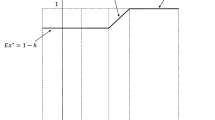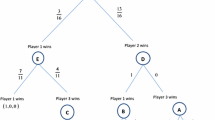Abstract
The optimal tournament for the heterogeneous contestants is described and developed in approach of game theory, which includes the sorted tournament between the strong contestants with high ability, the sorted tournament between the weak contestants with low ability, and the pooled tournament between the strong and the weak contestants. By comparing the equilibrium results of the incentive structure, the efforts level, and the expected profits in each kind of tournament, it is found that the strong contestants can get more utilities in the pooled tournament, and hence prefer to take part in the pooled tournament to compete with the weak competitors, while the weak contestants only can get the reservation utility in both the sorted and pooled tournament, and hence do not care about the abilities of competitors. The principal will choose and implement the sorted tournament because he can acquire more profits than that in the pooled tournament.
Similar content being viewed by others
References
Lazear, E.P., Rosen, S.: Rank order tournaments as optimum labor contracts. J. Polit. Econ. 89(5), 841–864 (1981)
Lazear, E.P.: Pay equality and industrial politics. J. Polit. Econ. 97(3), 561–580 (1989)
Kräkel, M.: U-type versus J-type tournaments as alternative solutions to the unverifiability problem. Labor Econ. 10(3), 359–380 (2003)
Hvide, H.K., Kristiansen, E.G.: Risk taking in selection contests. Games Econ. Behav. 42(2), 172–179 (2003)
Yun, J.: On the efficiency of the rank order contract under moral hazard and adverse selection. J. Labor Econ. 15(3), 466–494 (1997)
Gurtler, O.: On sabotage in collective tournaments. J. Math. Econ. 44(3), 383–393 (2008)
Gurtler, O., Munster, J.: Sabotage in dynamic tournaments. J. Math. Econ. 46(2), 179–190 (2010)
Altmann, S., Falk, A., Wibral, M.: Promotions and incentives: the case of multistage elimination tournaments. J. Labor Econ. 30(1), 149–174 (2012)
Moldovanu, B., Sela, A., Shi, X.W.: Carrots and sticks: prizes and punishments in contests. Econ. Inq. 50(2), 453–462 (2012)
Dubey, P., Geanakoplos, J., Haimanko, O.: Prizes versus wages with envy and pride. Jpn. Econ. Rev. 64(1), 98–121 (2013)
Marinakis, K., Tsoulouhas, T.: Are tournaments optimal over piece rates under limited liability for the principal? Int. J. Ind. Organ. 31(3), 223–237 (2013)
Klein, A.H., Armin, S.: Optimal effort incentives in dynamic tournaments. Games Econ. Behav. 103(5), 199–224 (2017)
Knyazev, D.: Optimal prize structures in elimination contests. J. Econ. Behav. Organ. 139(7), 32–48 (2017)
Roland, P., Bertrand, T., Narcisse, T.: Properties of ladder tournaments. Eur. J. Oper. Res. 263(1), 203–213 (2017)
Kräkel, M.: Optimal risk taking in an uneven tournament game with risk averse players. J. Math. Econ. 44(11), 1219–1231 (2008)
Jost, P., Kräkel, M.: Human capital investments in asymmetric corporate tournaments. J. Econ. Bus. 60(4), 312–331 (2008)
Gurtler, O., Krakel, M.: Optimal tournament contracts for heterogeneous workers. J. Econ. Behav. Organ. 75(2), 180–191 (2010)
Parreiras, S.O., Rubinchik, A.: Contests with three or more heterogeneous contestants. Games Econ. Behav. 68(2), 703–715 (2010)
Fonseca, M.A.: An experimental investigation of asymmetric contests. Int. J. Ind. Organ. 27(5), 582–591 (2009)
Hammond, R.G., Zheng, X.Y.: Heterogeneity in tournaments with incomplete information: an experimental analysis. Int. J. Ind. Organ. 31(3), 248–260 (2013)
Ryvkin, D.: The optimal sorting of players in contests between groups. Games Econ. Behav. 73(2), 564–572 (2011)
Brookins, P., Lightle, J.P., Ryvkin, D.: Optimal sorting in group contests with complementarities. J. Econ. Behav. Organ. 112(C), 311–323 (2015)
Dawid, H., Muehlheusser, G.: Repeated selection with heterogeneous individuals and relative age effects. J. Econ. Behav. Organ. 116(3), 387–406 (2015)
Figueroa, A.P., Montellano-Ballesteros, J.J., Olsen, M.: Strong sub-tournaments and cycles of multipartite tournaments. Discret. Math. 339(11), 2793–2803 (2016)
Alexander, K.: A new knockout tournament seeding method and its axiomatic justification. Oper. Res. Lett. 44(6), 706–711 (2016)
Aras, E.: Constructing day-balanced round-robin tournaments with partitions. Discret. Appl. Math. 235(1), 81–91 (2018)
Dixit, A.K.: Strategic behavior in contests. Am. Econ. Rev. 77(5), 891–898 (1987)
Acknowledgements
This work is supported by Social Sciences and Humanities Foundation of Chongqing, China under Grant No. 17SKG079.
Author information
Authors and Affiliations
Corresponding author
Rights and permissions
About this article
Cite this article
Wei, G., Bary, B. & Qin, Y. Sorted or pooled? Optimal tournament design for heterogeneous contestants. Cluster Comput 22 (Suppl 5), 12641–12648 (2019). https://doi.org/10.1007/s10586-018-1714-1
Received:
Revised:
Accepted:
Published:
Issue Date:
DOI: https://doi.org/10.1007/s10586-018-1714-1




